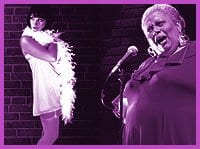“If I make my road rough, that’s the price I have to pay – not you. I’m having a good time, I’m having a good time, living my life today!”
Alberta Hunter
***
Sally Bowles, a fictional character in the musical Cabaret, and Alberta Hunter, the real life legendary blues singer, have something in common. They had a good time, more or less, singing their way through very bad times. Based on a Christopher Isherwood story, Sally’s life as a cabaret performer forms the basis of a musical that reveals how art and politics struggled with each other during the rise of the Nazis. Alberta Hunter’s career, dramatized in the current CanStage production of Cookin’ At The Cookery, spanned the 20th century as she toured Europe, the US, and parts of Asia and the Middle East.
Hunter was born in Memphis in 1895 and died in 1984. She fled from a depression-era economy for the clubs and concert halls of London and Paris where she worked steadily. When she returned to the US in the ’50s she was disillusioned by the state of American theatre and cabaret. She became a nurse at 61 and began a new career at NYC’s Goldwater Memorial Hospital for 20 years before returning to her first love, music, for the last seven years of her life.
Sally Bowles, on the other hand, never left Berlin. She stayed on after her lover left her and Nazi Germany for the safer ground of American soil. The ironies apparent in these women’s lives are complex and riveting. When their lives become musical theatre the balance between the good times and the bad is not easily struck.
Cabaret, now playing at the New Yorker Theatre, makes a valiant attempt to reproduce the stark, eerie quality of the Sam Mendes 1998 New York production – replete with homoerotic couplings, dissonant musical interludes and sharp, blinding lighting effects. Unfortunately, the production errs on the side of technical prowess. Performances are uneven, and what should be hard hitting, syncopated choreography never quite gels.
Clayton Lobbe’s effete, decadent Bobby has a remarkable solo during “Tomorrow Belongs To Me,” the unnerving Nazi anthem often sung by a wholesome, blonde Aryanesque boy. Lobbe’s voice rings out proud and clear, giving the song a wonderful resistant quality. Likewise, Daphne Moens as Fraulein Kost delivers a powerful reprise of the same Nazi propagandist tune.
Stephen Sheffer as the MC has an engaging solo with “I Don’t Care Much,” but his vocal skills are uneven during most of the show. Barbara-Lynn Redpath as Sally lacks physical and emotional presence. Although musically proficient, she never represents the kind of star quality Sally’s charismatic persona demands. Julia DeSotto as Fraulein Schneider and Allan Price as Herr Schultz are charming as the older romantic couple. None of the performers, however, benefit from a sound system that, on opening night, buzzed through many numbers with an irritating fervour.
Director Jordan Allison has attempted to create a gritty rendition of this incredible piece of musical theatre history. He succeeds intermittently as homoeroticized concepts become vaguely titillating, but the blocking veers out of focus too often and organ-izes performers into distracting, unmanageable ensembles. A high spirited, at times entertaining amateur production, Cabaret is peopled with a number of promising performers who need a great deal more experience and technical support in order to pull off a cohesive evening of professional musical theatre.
Cookin’ At The Cookery, on the other hand, takes troublesome history and masterfully turns it into a shallow – but entertaining – musical travelogue that breezes through racism, lesbianism, sexual abuse and death. Jackie Richardson is magnificent in the lead role, and her final “concert” gives the audience an opportunity to just sit and listen to a brilliant singer interpret Hunter’s work. Richardson’s co-star, Montego Glover, lends texture and warmth to an unsatisfying script. As the younger Hunter, as well as a variety of male supporting roles, she amazes with her physical and vocal skills. A highlight of the evening is her impersonation of Louis Armstrong. From her small agile frame comes the raspy, seasoned voice of the beloved Satchmo.
During an audience talkback session both Richardson and Glover say that the superficial quality of the script is not a problem because of what they consider to be a successful marriage between the strong rhythm of the spoken words and the songs. Glover feels that audiences do not need to be inundated with heavy political content in a depressing world.
Unlike Jordan Allison’s production of Cabaret, the CanStage production of director, choreographer and writer Marion J Caffey’s Cookin’ At The Cookery, makes very little attempt to blend gritty historical content with complex, at times lighthearted, musical motifs. Ironically, there is more entertainment value in the Cookery than there is in the Cabaret as both productions struggle with uneasy couplings of music and history.
* Cookin’ At The Cookery is held over until Mon, Dec 15 at the Bluma Appel Theatre (27 Front St E); call (416) 368-3110. Cabaret continues until Sat, Dec 6 at the New Yorker (651 Yonge St); call (416) 872-1111.

 Why you can trust Xtra
Why you can trust Xtra


